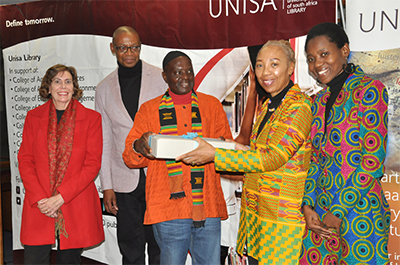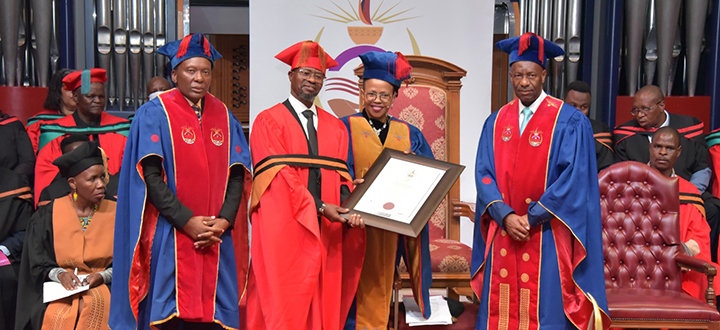News & Media
Bridging the gap between academia, the arts, and communities

Prof Marisa Keuris, Andile Xaba, Maishe Maponya, Dr Daisy Selloane Selematsela, and Prof Puleng Segalo
At an evening marked with song, poetry, and drumming, Maishe Maponya, a prominent South African playwright, director, poet, and activist, donated a collection of his private and public works to the Unisa Archives.
The official event took place at the Unisa Library on 14 June 2018, and the timing was a deliberate celebration and acknowledgement of the youth activism and sacrifice of 1976, in which Maponya took part. He went on to use his artistic life’s work as an instrument to fight apartheid’s oppressive regime.
The collection consists of three decades of work and forms an important part of the history of South African theatre. Throughout the 1980s, in spite of the aggressive censorship of the era, Maponya produced plays that protested and promoted resistance against the systematic dehumanisation of black South Africans under apartheid.
Maponya’s donation is on exhibition in the foyer (3rd floor entrance level) of the Unisa Library on the Muckleneuk Campus until the end of June 2018. On display are original posters of plays he directed and produced, audiovisual items, and photographs, among other special memorabilia that will be kept at the Unisa Archives and digitised in due course.
This initiative is part of the broader South African Drama and Theatre Heritage Project housed in the Department of Afrikaans and Theory of Literature in the University of South Africa’s College of Human Sciences (CHS). The initiative is headed by Professor Marisa Keuris and Andile Xaba, who are passionate about bridging the gaps that exist between academia, the arts and communities.
In her welcome address, Professor Puleng Segalo, Head of Research and Graduate Studies in CHS, said “… writing, and reflecting, about what was happening in South Africa during apartheid meant running the risk of getting arrested or even being killed. We are therefore indebted to those who risked their lives to ensure that our stories are told.”
Segalo emphasised that her college continually sought to create space for discussions on the state of the arts in general, and specifically, a platform for the tackling of thorny issues in informative, creative, innovative and entertaining ways.
Keuris took the audience through the process of building relations with iconic theatre practitioners and producers as well as relating how the various archival collections were acquired: “One of the main aims of the [South African Drama and Theatre Heritage Project] is to assist or mediate the preservation of our country’s performing arts heritage.” The intention is to gather and make these invaluable materials available and accessible to researchers and other interested parties, both locally and globally, in order to address existing gaps in our theatrical heritage.
Receiving the collection on behalf of the Unisa Library, Dr Daisy Selloane Selematsela, Executive Director, highlighted that: “We are proud to add Maishe Maponya’s contribution to the history of South African theatre to our collection. In 2016, we received the Mamelodi Theatre Organisation (MATO) Collection to preserve their legacy,” she added, and: “… in order to decolonise our university, we have to decolonise what we collect as a library, and items such as the MATO and Maishe Maponya Collections prove and demonstrate that we are headed in the right direction.”
Maponya took a moment to dedicate some poems to fellow artists and struggle icons such as the writer, director, poet, actor, editor of Staffrider from 1970-1981, and cultural theorist, Matsemela Manaka (1955-1998), and poet and social activist Ingoapele Madingoane (1951-1996). He performed his poems accompanied by fellow artist and acclaimed guitarist Bheki Khoza as well as the Medleko Drummers.
On 15 June 2018, a group of 1970s veterans were taken on a tour of the Unisa Library. Maponye said: “It is an honour to walk my colleagues through my life in the arts and to reflect together on this archive that will now reside at the Unisa Library.”
For more protest theatre and poetry searches in the library see the following links:
Publish date: 2018-06-21 00:00:00.0

 Young Unisa science stars join elite Lindau Nobel Laureate group
Young Unisa science stars join elite Lindau Nobel Laureate group
 Education MEC addresses Unisa autism seminar
Education MEC addresses Unisa autism seminar
 Seven Unisans nominated for the NSTF-South32 Awards 2023/2024
Seven Unisans nominated for the NSTF-South32 Awards 2023/2024
 Unisa awards posthumous honorary doctorate to literary maven, OK Matsepe
Unisa awards posthumous honorary doctorate to literary maven, OK Matsepe
 From humble beginnings to academic leadership
From humble beginnings to academic leadership